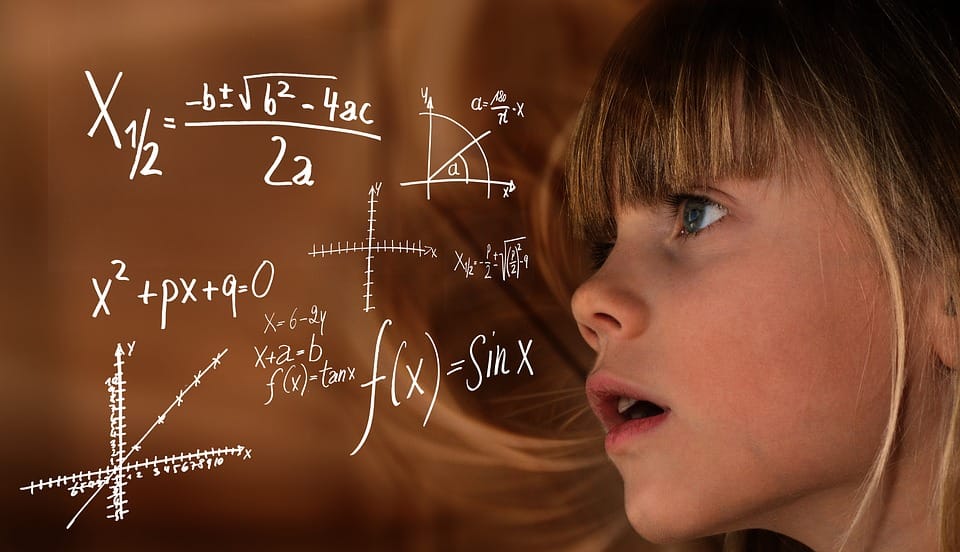There is a popular idea that some children have innate mathematical abilities, thanks to which some children learn mathematics better than others. We checked whether it has a scientific basis.
The question of whether there is so-called mathematical thinking and an innate inclination towards this science can be found in portals For parents and on women's forums. Service users ask questions about this "Yandex.Q". The media writes about the genes for mathematical abilities that are inherited from parents (for example, the TV channel "World", "RIA Novosti", "Komsomolskaya Pravda") and popular science portals.
In 2013, psychologists from the University of Pittsburgh conducted experiment. They explored the non-symbolic feeling numbers (the ability to determine quantities offhand, without precise counting) in six-month-old infants and their subsequent mathematics performance at three and a half years. The infants were shown cards with pictures of different objects. On some of the cards the number of items was different. Some children noticed this difference, others did not. Scientists were able to trace this by how long the children kept their gaze on the cards. Three years later, the same children were tested on their knowledge of numbers and the ability to count to ten. It turned out that the better the number sense was developed in children who had not even learned to speak, the better they coped with simple mathematical tasks at a more conscious age. This gave rise to the hypothesis that aptitude for mathematics may indeed be innate.
A few years later, American scientists conducted study, which asked five- to eight-year-old children and their parents to take several math tests. They noticed a direct relationship between the speed at which children completed tasks and their parents, which gave them reason to claim that talent for mathematics can be inherited.
In 2020, German scientists partially confirmed this hypothesis. During research They gave magnetic resonance imaging (MRI) scans to 178 children between three and six years old and then asked them to complete a series of math tasks. They identified which areas of the brain are responsible for successfully completing these types of tests. They then conducted the same study, but on children aged seven to nine years. The comparison showed that the tasks were most successfully completed by those children whose volume of the right parietal cortex was increased. The ROB01 gene discovered by scientists, which is inherited, is responsible for its volume. That is, perhaps mathematical abilities can be inherited.

By opinion American scientists, there is also a correlation between the structure of the brain and how easy it is for children to learn mathematics. During the experiment, 24 children aged eight to nine years studied with individual math tutors for two months. Of course, all children showed significant progress in learning, but some were able to outpace other participants in the experiment. All children underwent an MRI before the study, and a comparison of brain structure and learning success showed that mathematics was easier and faster for those children whose hippocampal volume was initially larger. Also, the most successful children in mathematics had stronger neural connections between the hippocampus and areas of the brain that are not responsible for arithmetic, as one might think, but for the formation of long-term memory.
However, not all scientists are of the opinion that mathematical ability is an innate quality, and they have their own arguments. For example, a study by scientists from different countries, including Russia, partly refuted results of Pittsburgh researchers on the connection between number sense and success in mathematics. They tested 56 adolescents aged 16–17 years. Some of them studied in specialized gymnasiums, and some in secondary schools. They all showed the same level of number sense, but the grammar school students showed significantly higher results in math tests.
Stanford professor Jo Bowler, who taught mathematics in schools for many years, wrote a book called "Mathematical Thinking", where she talked about several experiments that refute arguments about the volume of the hippocampus. She gave the example study, conducted with taxi drivers in London, who during training had to memorize all the streets of the city. They were given MRI scans at the beginning and end of their studies, and it turned out that in those who completed the training successfully, the hippocampus increased significantly in size during this time. Thus, it is possible that in children who were more successful in mathematics, this was not an innate quality, but a consequence of intensive training (and not necessarily mathematics!) that preceded the experiment.

Study, conducted in 2020 in the USA, showed that whatever the genetic inclinations, success in mathematics is largely influenced by the environment in which the child grows and learns. So, they conducted a study on three thousand American teenagers, comparing their polygenic scores (learning abilities encoded in DNA), environment and success in mathematics. It turned out that if a teenager lives in a dysfunctional family and studies in a bad school, his success in mathematics will also be quite disastrous - despite his natural inclinations. Conversely, students with low polygenic scores, studying in good schools and living in high-income families, showed fairly good math skills.
We asked mathematics teacher Konstantin Knop, a member of the jury of mathematical Olympiads and a popularizer of science, to share his opinion on an issue that interests us. Knop replied: “Genes influence math success much less than education. I saw an adopted child who had outstanding mathematical abilities, which were simply explained by the fact that he was taught a lot and he himself wanted to be like his dad, a mathematician.
As for the sense of number, perhaps the ability to count objects at one glance is truly innate, but the connection with mathematics here is very indirect. Mathematics is not the ability to count to any degree, it is the ability to reason. And it is not connected with the ability to quickly understand offhand whether there are six or seven cows in front of us. Hard work and perseverance are much more important qualities for mastering mathematics than any other properties. And of course, it is very important that parents work with their child from birth, and not when they begin to notice some kind of ability in him.”
Thus, scientists have not yet come to a conclusion whether there is an innate ability for mathematics. However, a much more widespread opinion is that, whatever the inclinations, a favorable living environment, access to education, and the child’s own desire and interest are much more important for the development of mathematical skills.
Mostly not true
Read on the topic:
- Joe Bowler. Mathematical thinking
- Did Mikhail Vasilyevich Lomonosov say that mathematics “puts your mind in order”?
- Is it true that 25-year-old student George Danzig accidentally solved two unsolved math problems?
If you find a spelling or grammatical error, please let us know by highlighting the error text and clicking Ctrl+Enter.






